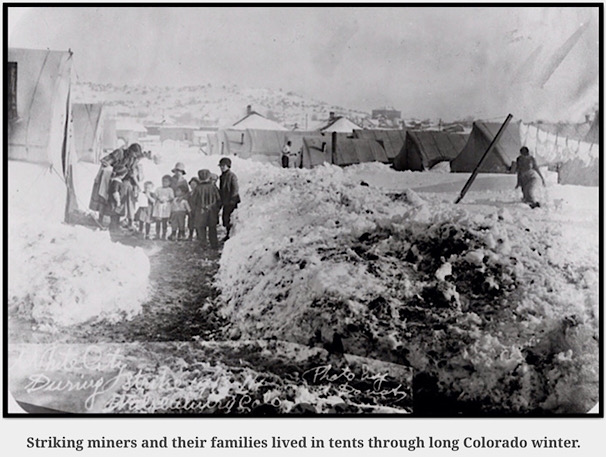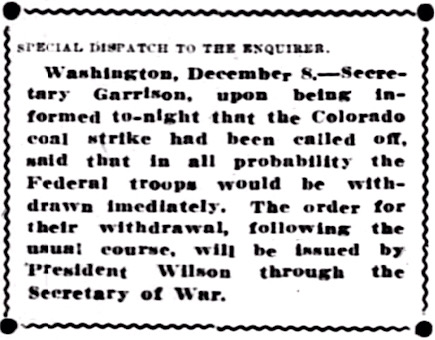 —————
—————
Hellraisers Journal – Thursday December 10, 1914
Denver, Colorado – District 15 Calls Off Long Strike, Recognizes “No Surrender”
Meeting in convention in Denver, delegates of District No. 15 of the United Mine Workers of America unanimously voted to call off all strikes in the coal fields of Colorado, this decision to be effective on December 10th in both the northern and southern regions of the state.
The striking miners and their families endured through the long Colorado winter, living in tents after being evicted from the company towns. They faced hundreds of armed company guards who were deputized by the local sheriffs, a state militia infested with such company gunthugs, mass imprisonment, search lights that terrorized them in their tents at night. And yet their determination and solidarity remained unbroken.
Finally, with the spring, came the Ludlow Massacre followed by the ten day war. And still they remained determined to endure to the end. Now, many months later, that great strikebreaker, hunger, haunts them as they face another winter in the tents.
Their hopes for justice now depend on yet another committee and yet another investigation. This time, the committee is appointed by President Wilson. There is no agreement from the coal operators, led by Rockefeller’s Colorado Fuel and Iron Company, to abide by the findings of said committee.
In announcing the termination of the strike, the United Mine Workers of America recognized no surrender:
We recognize no surrender and shall continue to propagate the principles of our humanitarian movement throughout the coal fields of Colorado.
From The Cincinnati Enquirer of December 9, 1914:
STRIKE
———-
Ended in Colorado.
———-
Miners Act Favorably on
Advice of Executives.
———-
Troops May Be Called Off
Immediately.
———-
Order For Return of Men
To Pits Marks Finish
———-
Of Industrial Struggle That Has Cost Millions
and Lives of Scores of Combatants
———-
SPECIAL DISPATCH TO THE ENQUIRER.
Denver, Colo., December 8.-The coal miners’ strike in both the Northern and Southern Colorado coal fields was called off to-night. the miners voted to end the strike on December 10. This action was taken by the the convention of District No. 15 of the United Mine Workers of America by a unanimous vote late to-night after an all-day session, and ratifies the report of the International Executive Board introduced to-day recommending the termination of the strike.
The Executive Committee recommended ending the strike on the ground that such action would strengthen the union’s position in view of the appointment by President Wilson of a permanent commission, headed by Seth Low, to consider future differences in the coal fields.
Frank J. Hayes, International Vice President, in a statement to the convention explained in detail the reasons which impelled the International Board to make its recommendations, and there followed in executive session a lengthy and spirited discussion.
“Recognize No Surrender.”
“We recognize no surrender and shall continue to propagate the principles of our humanitarian movement throughout the coal fields of Colorado.” says the communication in announcing the determination of the Executive Board to termination the strike.
After reviewing the efforts of the Federal Government to effect a settlement of the controversy and quoting correspondence which passed between President Wilson and the United Mine Workers of America, the communication says that in view of the recent action of the President in appointing a Federal Mediation commission, “we deem it the part of wisdom to accept his (the President’s) suggestion and to terminate the strike.”
Final efforts on the part of the United Mine Workers to settle the strike, the communication states, began with the acceptance on September 16 of President Wilson’s proposal of a three-year truce. This action was taken by a district convention at Trinidad.
“Would Terminate Strike.”
[From the report of the U. M. W. International Executive Board:]
We were of the opinion…that such action on our part would speedily terminate the strike, not thinking for an instant that the operators would refuse the President’s plan of settlement, especially when this plan meant nothing more nor less than the impartial enforcement of the labor and mining laws of Colorado and the appointment of an industrial commission by the President to see that such laws were enforced. In the refusal of the operators to accept the plan of settlement proposed by the President, and their insistence on their continuation of a system which stands for industrial chaos and anarchy, they forfeit the support, if they persist in maintaining this position, of every right thinking, law-a-biding American citizen. When the operators refused to accept the President’s proposal we entertained the hope that President Wilson would enforce his proposition by governmental action. After waiting for more than two months for some measure to be adopted by the President that would terminate the strike, and receiving no definite word as to what his final action might be, we concluded to arrange a meeting with the President and accordingly we met with him at the White House on Thursday November 19.
He informed us at that time that he was legally advised that he could not take over the Colorado coal mines and operate them under governmental supervision, and thus force settlement of the strike in accord with the peace plan he had submitted. The President expressed deep regret that the operators had seen fit to disregard his wishes in the matter, and informed us he would do everything he could legally to bring about a settlement of the controversy.
Has Proved To Be Costly.
In duration, sacrifice of life, property and in monetary loss to the state, the Miners’ Union, the coal operators, the miners, railroads and private industries, the Colorado coal strike has been one of the costliest in the history of American mining.
The strike began in the Northern Colorado coal fields April 4, 1910. The state wide strike, called September 23, 1913, virtually paralyzed the industry in Colorado, threw the commonwealth into turmoil and finally led to the calling out of the state militia, and later to the importation of Federal troops.
Eighteen million dollars is estimated as the cost of the strike, shared by all affected. According to the union officials, more than $3,000,000 has been paid out in strike benefits. Loss of wages is estimated as more than $6,000,000.
Sixty-six persons are known to have been killed and about 50 injured as a result of disorders incident to the strike. The battle between strikers, mine guards and state troops at Ludlow, April 20, 1914, ended in the destruction of the strikers’ tent colony. Twelve children and two women were found dead in the ruins. Subsequent warfare included attacks upon various mining camps in Las Animas, Huerfano, Fremont and Boulder Counties. The arrival of Federal troops, April 30, 1914, restored peace.
The original demands of the strikers included recognition of the union, a 10 per cent wage advance, an eight-hour day, miners to choose their check weighmen, pay for “narrow” and “dead” work, the right not to trade in company stores and a strict enforcement of the state mining laws. The demand for recognition of the union recently was waived, however, in accordance with the suggestion of President Wilson in a proposal for a three-year truce, which was accepted by the miners but rejected by the operators.
——————–
SON OF OIL MAGNATE
———-
Played Big Part in Direction of Strike,
Testimony Indicates.Denver, Colorado, December 8.-The revelation that Ivy L. Lee, of Philadelphia, was the author of the pamphlet: “Facts About the Colorado Struggle for Industrial Freedom,” and of other publicity matter, and the desire of John D. Rockefeller Jr., to win the coal strike and to sway public opinion to the operators’ side of the controversy was shown in a telegram from Rockefeller, Lee and associates to President J. F. Welborn, of the Colorado Fuel and Iron company, introduced before the Federal Commission on Industrial relations to-day.
Not all of the more than 10,000 words of instructions, advices and inquiry that came in telegrams to Welborn from Rockefeller, Starr J. Murphy, Jerome D. Greene, Ivy L. Lee, W. L. MacKenzie King, Formerly Canadian Minister of Labor, now Commissioner of Industrial Unrest of the Rockefeller Foundation, and J. H. McClement, of the “Rockefeller group” in the corporation, were read.
The communications covered from June until November this year and indicated that Welborn was referred to by Rockefeller as his agent in the field and that the other operators were sustained in their policy during that period.
Elbert Hubbard, of East Aurora, N. Y., according to Rockefeller’s communication, received $200 for a thousand copies of his magazine containing an article favorable to the operators’ side of the controversy.
Welborn told Commissioner Walsh that since he had not seen the story before it was printed, and because it was paid for before it was printed, he considered it “fair-minded” publicity, uninfluenced by the operators.
In the thousand-word telegram from Ivy L. Lee, read by Welborn at the opening of his testimony, Lee said:
“There is no mystery about the preparation of bulletins and pamphlets last June, Mr. John D. Rockefeller, Jr., stated to me that the public had, by reason of inaccurate information spread abroad by the United Mine Workers of America, conceived a wholly wrong impression of the facts of the Colorado strike.”
Lee’s dispatch said that Rockefeller conceived it his duty to use his influence to issue statements from the operators side of the case, that the public could judge for itself. Lee was therefore asked by Mr. Rockefeller to advise with the operators, Lee continued:
“The available printed information was secured and from it I culled such matter as seemed significant. Great care was taken to pick out statements of facts which had been made by disinterested observers.”
[Emphasis added]
~~~~~~~~~~~~~~~~~~~~~~~~~
SOURCES
Quote Mother Jones Babes of Ludlow, Speech at Trinidad CO
UMW District 15 Special Convention, Sept 15, 1914, ES1 p154 (176 of 360)
https://digital.library.pitt.edu/islandora/object/pitt%3A31735035254105/viewer#page/176/mode/2up
The Cincinnati Enquirer
(Cincinnati, Ohio)
-Dec 9, 1914
https://www.newspapers.com/image/33760802/
IMAGE
Children in snow at tent colony
by Lou Dold, Winter 1913 1914, CO Hx
https://www.historycolorado.org/children-ludlow-02
https://childrenofludlowmassacre.wordpress.com/ludlow-artifacts/
See also:
Hellraisers Journal – Tuesday December 8, 1914
Denver, Colorado – J. F. Welborn Testifies Before Walsh Commission
Industrial relations: final report and testimony, Vol. 7
United States. Commission on Industrial Relations
D.C. Gov. Print. Office, 1916
CIR p6545: Fri Dec 4th, Welborn Testimony Begins
https://babel.hathitrust.org/cgi/pt?id=uiug.30112087783293&seq=555
CIR p6549-Sat Dec 5th, Welborn Continued
https://babel.hathitrust.org/cgi/pt?id=uiug.30112087783293&seq=559
CIR p6606-Mon Dec 7th, Welborn Continued
https://babel.hathitrust.org/cgi/pt?id=uiug.30112087783293&seq=616
Nov 30, 1914, New York Tribune
“WILSON APPOINTS STRIKE ADJUSTERS…
Seth Low, Charles W. Mills and Patrick Gilday
Members of the [Colorado Coal] Commission.”
https://chroniclingamerica.loc.gov/lccn/sn83030214/1914-11-30/ed-1/seq-6/
United States Congressional serial set,
Issue 7099, 1916
“Report of the Colorado Coal Commission”
(search with “labor difficulties colorado” “seth low”)
https://books.google.com/books?id=KJ43AQAAIAAJ
Facts Concerning the Struggle in Colorado for Industrial Freedom [Series I]
Issued by the Committee of Coal Mine Managers. Denver, 1914
https://archive.org/details/factsconcernings00commrich/page/n3/mode/2up?view=theater
The Struggle in Colorado for Industrial Freedom [Series II]
Issued by Committee of Coal Mine Managers, 1914
https://books.google.com/books?id=9kowAAAAYAAJ&source=gbs_navlinks_s
Selected Writings of Elbert Hubbard, Vol 7
(search: “in colorado”) -p335-346
https://books.google.com/books?id=yFtIAAAAYAAJ
Out of the Depths
The Story of John R. Lawson, A Labor Leader
-Barron B. Beshoar
Colorado Labor Historical Committee
of the Denver Area Labor Federation, 1942
https://archive.org/details/outofdepths0000unse
-re operators’ claim (per Hubbard) that miners make $4/day
https://archive.org/details/outofdepths0000unse/page/90/mode/1up?q=winter&view=theater
-re Ivy Lee
https://archive.org/details/outofdepths0000unse/page/231/mode/1up?q=ivy+lee&view=theater
The Ludlow Massacre
-by Walter H. Fink
Director of Publicity, District 15, U. M. W. A., 1914
https://archive.org/details/ludlowmassacrere00finkrich/page/n1/mode/2up
Tag: Colorado Coalfield Strike of 1913-1914
https://weneverforget.org/tag/colorado-coalfield-strike-of-1913-1914/
~~~~~~~~~~~~~~~~~~~~~~~~~~~~~~
Worker’s Song by Dropkick Murphys
United States Congressional serial set,
Issue 7099, 1916
“Report of the Colorado Coal Commission”
(search with “labor difficulties colorado”)
http://books.google.com/…


